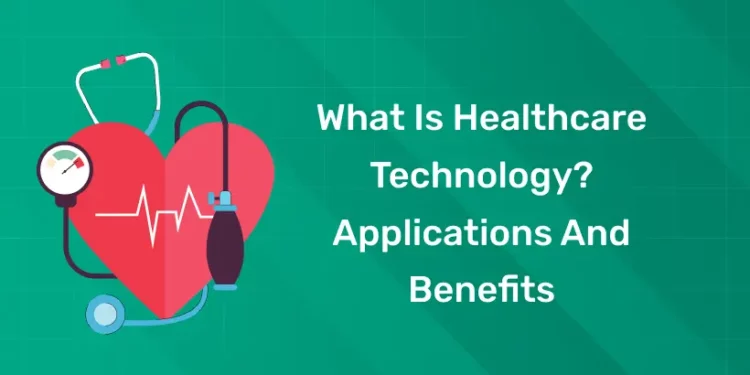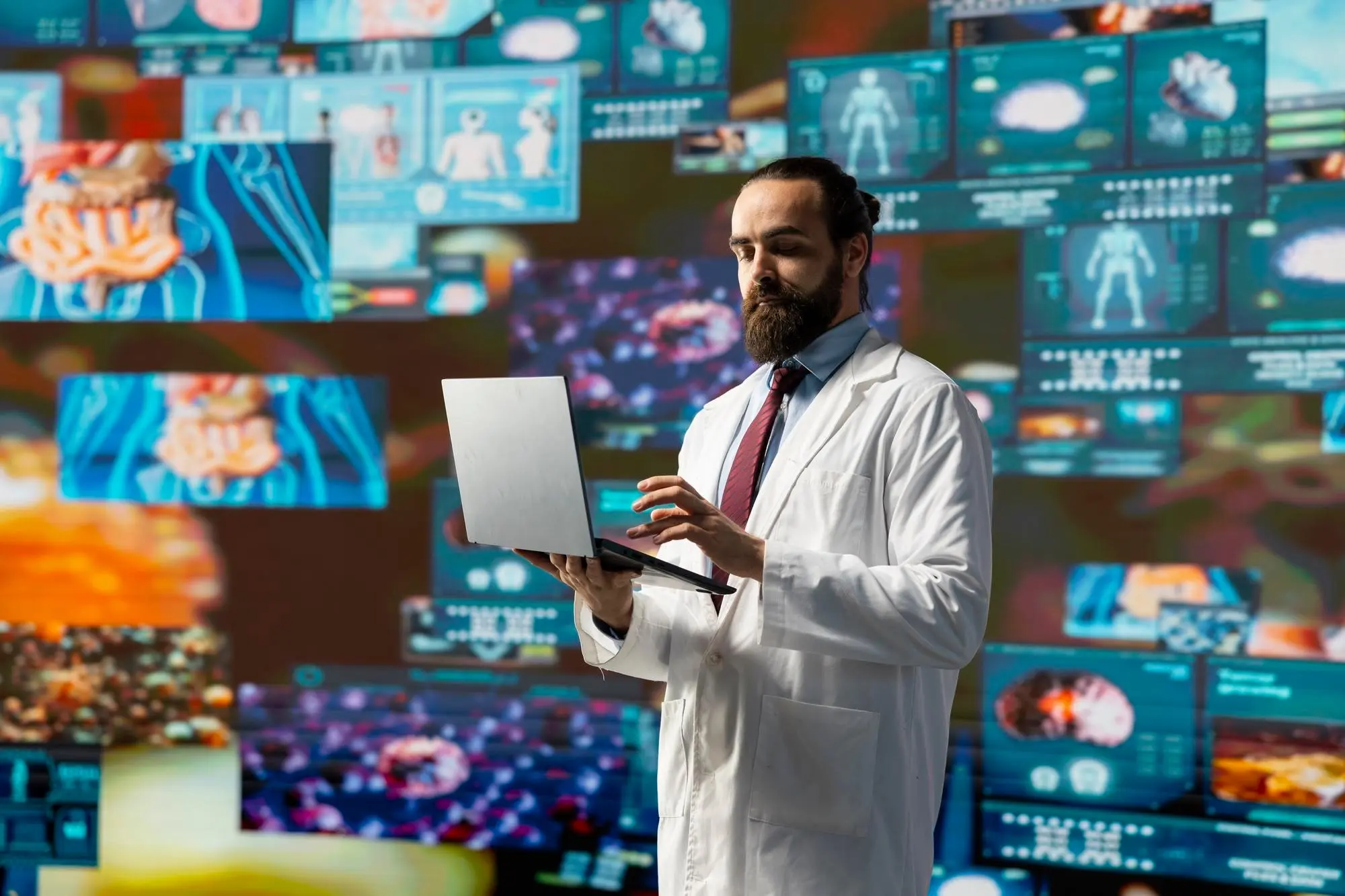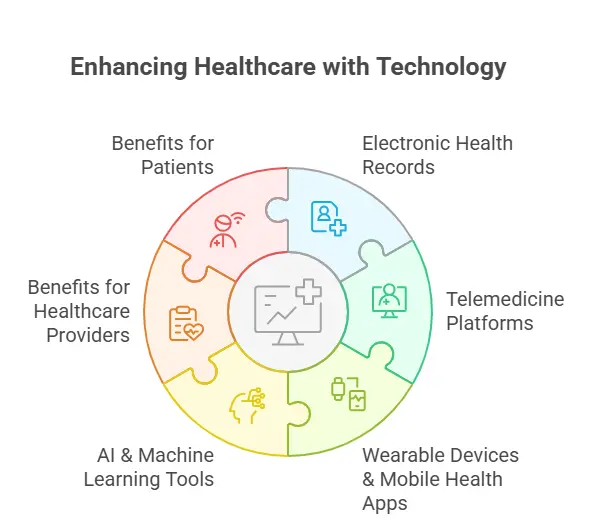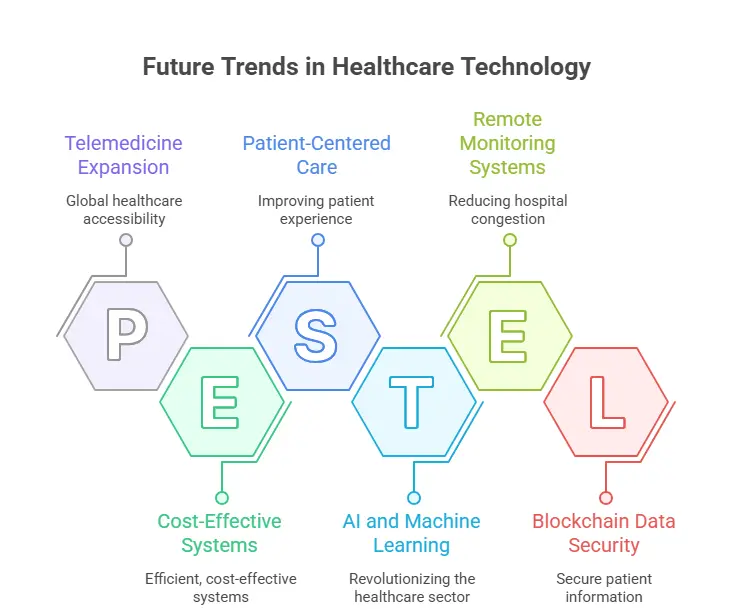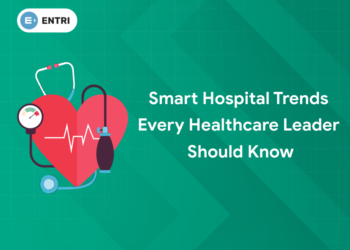Table of Contents
Healthcare technology is transforming the way medical professionals deliver care and patients receive treatment. From electronic health records to telemedicine and wearable devices, technology is making healthcare faster, more accurate, and more accessible. In today’s digital world, these innovations help hospitals improve efficiency, reduce errors, and enhance patient experiences. This blog explores what healthcare technology is, its key applications, and the many benefits it brings to the healthcare industry.
Explore Your Future in Hospital Administration! Enroll now
Introduction
Technology is changing the way healthcare is provided and experienced by patients and medical professionals. It combines innovation with healthcare to improve patient care, streamline hospital operations, and enhance overall efficiency. From digital patient records and telemedicine to AI-driven diagnostics and wearable health trackers, technology is playing a vital role in modern healthcare systems. These tools help doctors make quicker and more accurate decisions, reduce human errors, and provide better treatment outcomes.
For patients, healthcare technology offers convenience, faster consultations, and access to personalized care from anywhere. It also empowers individuals to monitor their own health and stay proactive about their well-being. As the healthcare industry continues to evolve, technology acts as the bridge connecting patients, professionals, and data in a seamless ecosystem. With continuous innovations, healthcare technology is not just improving medical practices but also shaping a healthier and more connected future for everyone.
What is Healthcare Technology?
1: What is the primary role of a hospital administrator?
Healthcare technology refers to the use of tools, software, devices, and systems to improve the delivery, management, and efficiency of healthcare services. It combines medical expertise with modern technology to make healthcare safer, faster, and more accessible. Healthcare technology enhances both the quality and efficiency of medical services. It reduces human errors, speeds up processes, and ensures better patient outcomes.
As technology continues to evolve, it is reshaping the healthcare industry, making it more connected, data-driven, and patient-centered. In essence, healthcare technology bridges the gap between medical expertise and innovation, creating a smarter and more effective healthcare system for everyone.
Key Components of Healthcare Technology
- Electronic Health Records (EHRs): Digital patient records that allow doctors and nurses to access medical histories quickly, reducing errors.
- Telemedicine Platforms: Enable remote consultations, making healthcare accessible to patients in rural or underserved areas.
- Wearable Devices & Mobile Health Apps: Help patients monitor vital signs, fitness, and manage chronic conditions from home.
- AI & Machine Learning Tools: Assist in early disease detection, accurate diagnoses, and treatment recommendations.
Benefits for Healthcare Providers
- Streamlines administrative tasks and hospital operations.
- Improves communication between doctors, nurses, and staff.
- Reduces human errors and enhances decision-making.
- Provides real-time access to patient data for better care planning.
Benefits for Patients
- Offers convenience through remote consultations and digital tools.
- Enables personalized care with data-driven insights.
- Supports proactive health management with wearable devices and apps.
- Improves overall patient experience and treatment outcomes.
Hospital Administration Course with Assured Career Growth
Hospital Administration Course by Entri App: Master essential healthcare management skills, gain certification, and secure top roles in leading hospitals
Join Now!Importance of Technology in Modern Healthcare
Technology has become an indispensable part of modern healthcare, transforming the way medical services are delivered, managed, and experienced. By integrating digital tools, software, and innovative devices, healthcare providers can improve patient outcomes, increase efficiency, and reduce operational challenges. The rapid advancement in healthcare technology has revolutionized hospitals, clinics, and patient care worldwide.
1. Enhanced Patient Care
One of the most significant benefits of healthcare technology is the improvement in patient care and outcomes. Digital systems provide real-time access to patient data, helping doctors make informed decisions quickly and accurately. This leads to faster diagnosis, better coordination of care, and improved patient satisfaction.
- Personalized Treatment: Data-driven insights from EHRs and AI tools help design tailored treatment plans for each patient.
- Remote Consultations: Telemedicine allows patients to consult healthcare professionals from home, reducing travel time and wait times.
- Continuous Monitoring: Wearable devices and mobile health apps track vital signs, medication adherence, and chronic conditions.
- Improved Diagnostics: AI-powered imaging and diagnostic tools enhance accuracy and reduce errors in detecting diseases.
2. Efficient Hospital Operations
Healthcare technology streamlines hospital and clinic operations, saving time, money, and valuable resources. Automated systems help reduce human dependency for repetitive tasks, allowing staff to focus more on patient care.
- Electronic Health Records (EHRs): Centralized digital records reduce paperwork and ensure accurate patient information.
- Automated Scheduling and Billing: Technology simplifies appointment management, staff scheduling, and financial processes.
- Interdepartmental Communication: Digital platforms improve collaboration between doctors, nurses, and support staff.
- Inventory Management: Automated systems track medical supplies, reducing shortages and wastage.
3. Early Detection and Disease Prevention
Technology plays a key role in preventive healthcare by enabling early detection and timely treatment of diseases. This proactive approach not only saves lives but also reduces the burden on healthcare systems.
- Predictive Analytics: AI and machine learning analyze data to identify patients at risk for certain conditions.
- Remote Monitoring: Devices and apps alert healthcare providers when vital signs indicate potential issues.
- Preventive Care Programs: Digital tools help manage chronic diseases, vaccinations, and health checkups proactively.
4. Cost Reduction and Resource Management
Implementing technology in healthcare reduces operational costs while improving service quality. Hospitals can allocate resources more efficiently and eliminate unnecessary procedures or paperwork.
- Efficiency in Operations: Automation minimizes time spent on manual tasks like record-keeping and reporting.
- Reduced Hospital Visits: Telemedicine and remote monitoring decrease unnecessary admissions.
- Optimized Resource Use: Hospitals can manage staff, equipment, and facilities more effectively with real-time data.
5. Increased Patient Engagement and Education
Technology empowers patients to take an active role in their health management and decision-making. With easy access to information, patients feel more confident and involved in their care journey.
- Mobile Apps and Portals: Patients can track appointments, prescriptions, and test results conveniently.
- Educational Platforms: Online resources provide awareness about diseases, treatments, and healthy habits.
- Enhanced Treatment Adherence: With reminders and interactive tools, patients follow prescribed treatments more effectively.
6. Supporting Research and Innovation
Healthcare technology also accelerates medical research and drives continuous innovation in medicine. It enables researchers and scientists to analyze data at a scale and speed that was previously impossible.
- Data Collection and Analysis: Large-scale health data helps researchers identify trends and patterns.
- Clinical Trials Management: Digital platforms streamline patient enrollment, monitoring, and reporting.
- AI in Drug Discovery: Advanced algorithms assist in faster development of new medicines and treatments.
Key Applications of Healthcare Technology
Healthcare technology has transformed the medical field by introducing tools and systems that improve patient care, streamline operations, and enhance overall efficiency. From hospitals and clinics to home-based care, technology plays a pivotal role in modern healthcare. Below are some of the key applications of healthcare technology:
1. Electronic Health Records (EHRs)
EHRs are digital versions of patients’ medical histories. They replace traditional paper records and allow doctors and nurses to access patient information quickly and securely.
Benefits:
- Centralized patient data for quick decision-making
- Reduces medical errors caused by misreading paper records
- Enables better coordination between departments and specialists
Example: A doctor can instantly access a patient’s past surgeries, medications, and allergies, ensuring accurate treatment.
2. Telemedicine and Remote Healthcare
Telemedicine allows patients to consult healthcare professionals remotely through video calls, apps, or online portals.
Benefits:
- Provides access to healthcare in rural or remote areas
- Reduces the need for in-person visits, saving time and money
- Helps manage chronic diseases through remote monitoring
Example: Patients recovering from surgery can follow up with doctors virtually, reducing hospital visits.
3. Wearable Devices and Mobile Health Apps
Wearable devices like smartwatches, fitness trackers, and medical sensors help monitor vital signs, physical activity, and health metrics. Mobile apps complement these devices by tracking symptoms, medications, and fitness goals.
Benefits:
- Continuous health monitoring
- Early detection of abnormalities
- Encourages proactive health management
Example: A diabetic patient uses a glucose monitoring device synced with an app to track blood sugar levels daily.
4. Artificial Intelligence (AI) and Machine Learning
AI and machine learning are revolutionizing diagnostics, treatment planning, and patient care.
Benefits:
- Faster and more accurate disease detection
- Predictive analytics to identify at-risk patients
- Personalized treatment plans based on patient data
Example: AI-powered imaging tools detect early-stage tumors more accurately than traditional methods.
5. Hospital Management Software (HMS)
Hospital Management Software automates administrative and operational tasks within healthcare facilities.
Benefits:
- Streamlines scheduling, billing, and inventory management
- Improves coordination between departments
- Reduces administrative errors and paperwork
Example: A hospital uses HMS to track bed availability, manage staff schedules, and generate patient bills automatically.
6. Robotics and Automation
Robotics and automation assist in surgeries, laboratory tasks, and routine hospital operations.
Benefits:
- Enhances precision in surgeries
- Reduces human error in repetitive tasks
- Speeds up lab tests and medical procedures
Example: Surgical robots help perform minimally invasive surgeries with higher accuracy and faster recovery times.
7. Health Information Systems (HIS) and Big Data Analytics
Health Information Systems collect, store, and analyze large amounts of patient data. Big data analytics helps identify health trends, predict outbreaks, and improve healthcare planning.
Benefits:
- Better decision-making for hospitals and policymakers
- Improved population health management
- Supports research and clinical studies
Example: Public health authorities use data analytics to track disease outbreaks and allocate resources effectively.
Explore Your Future in Hospital Administration! Enroll now
Benefits of Healthcare Technology
Healthcare technology has revolutionized the medical field, improving patient care, operational efficiency, and overall healthcare outcomes. By integrating digital tools, software, and innovative devices, hospitals, clinics, and healthcare providers can deliver better services while reducing errors and costs. Here are the key benefits of healthcare technology in detail:
1. Improved Patient Care
Healthcare technology enhances the quality and accuracy of patient care. Digital tools, wearable devices, and AI-powered diagnostic systems allow medical professionals to make faster and more informed decisions.
- Personalized Treatment: Doctors can use data from electronic health records (EHRs) and predictive analytics to provide treatment tailored to each patient.
- Faster Diagnosis: AI and machine learning tools can analyze medical images and test results quickly, helping detect diseases early.
- Better Monitoring: Wearable devices track vital signs and chronic conditions, alerting doctors if any abnormality is detected.
2. Increased Efficiency and Reduced Errors
Healthcare technology streamlines administrative and clinical workflows, making hospitals more efficient.
- Electronic Health Records: Reduce paperwork and human errors caused by manual record-keeping.
- Automated Processes: Scheduling, billing, and inventory management systems save time and reduce mistakes.
- Improved Coordination: Digital communication platforms connect different departments, improving collaboration.
3. Cost Reduction
Technology in healthcare helps save costs for both providers and patients.
- Operational Savings: Automation reduces administrative workload and optimizes resource use.
- Reduced Hospital Visits: Telemedicine and remote monitoring reduce unnecessary in-person consultations.
- Efficient Resource Management: Hospitals can track equipment, staff, and medication usage in real-time, minimizing wastage.
4. Accessibility and Convenience
Modern healthcare technology makes medical services more accessible and convenient for patients.
- Remote Consultations: Telemedicine allows patients to consult doctors from home, especially in rural areas.
- 24/7 Monitoring: Wearable devices and health apps provide continuous health tracking.
- Patient Portals: Patients can access medical records, test results, and treatment plans anytime.
5. Early Detection and Preventive Care
Healthcare technology supports preventive medicine by identifying risks before they become severe.
- Predictive Analytics: AI identifies patients at risk of certain conditions for early intervention.
- Remote Monitoring: Continuous tracking of vitals helps prevent complications in chronic conditions.
- Health Education: Apps and online platforms educate patients on healthy habits and disease prevention.
6. Support for Research and Innovation
Technology accelerates medical research and innovation, leading to improved healthcare solutions.
- Data Collection: Large-scale patient data supports clinical studies and trend analysis.
- AI in Drug Discovery: Algorithms help develop new medicines faster.
- Improved Clinical Trials: Digital platforms streamline patient recruitment, monitoring, and reporting.
Hospital Administration Course with Assured Career Growth
Hospital Administration Course by Entri App: Master essential healthcare management skills, gain certification, and secure top roles in leading hospitals
Join Now!Future Trends in Healthcare Technology
Healthcare technology is evolving rapidly, and the future promises even more innovative solutions that will transform the way medical care is delivered. Emerging technologies are not only improving patient care but also making healthcare systems more efficient, cost-effective, and patient-centered. Here are some of the key trends shaping the future of healthcare technology:
1. Artificial Intelligence (AI) and Machine Learning
AI and machine learning are revolutionizing the healthcare sector by analyzing massive amounts of medical data faster and more accurately than ever before. These technologies can interpret patient records, diagnostic images, lab results, and genetic information within seconds, helping doctors make informed decisions quickly.
- Predictive Healthcare: AI systems can forecast disease risks, predict outbreaks, and even identify early signs of serious illnesses before they become critical. This allows hospitals to take preventive action and reduce the burden of chronic diseases.
- Improved Diagnostics: Machine learning algorithms are increasingly used in radiology, pathology, and cardiology to detect abnormalities such as tumors, blood clots, or heart diseases with remarkable precision.
- Personalized Treatment: AI helps create customized treatment plans based on individual health data, genetics, and lifestyle patterns. This ensures patients receive more targeted and effective care.
In the future, AI-powered chatbots and virtual health assistants will also become more common, helping patients book appointments, monitor their symptoms, and get reliable health information instantly.
2. Telemedicine and Remote Care Expansion
Telemedicine has emerged as a game-changer, especially since the COVID-19 pandemic. It allows patients to consult doctors virtually, eliminating geographical barriers and reducing the need for hospital visits. As internet connectivity and digital tools improve, telehealth will become an essential part of global healthcare delivery.
- Global Accessibility: Patients in rural or remote regions will gain access to specialized medical advice without traveling long distances.
- Home-Based Care: Remote monitoring systems and digital health devices will allow people with chronic illnesses to manage their conditions from home while staying connected to healthcare providers.
- Virtual Health Communities: Online platforms will bring together patients with similar health challenges, creating supportive spaces for learning, emotional support, and shared experiences.
Telemedicine is expected to reduce hospital congestion, cut costs, and improve patient satisfaction through faster, more convenient healthcare access.
3. Wearable Technology and IoT in Healthcare
The Internet of Things (IoT) and wearable health devices are making healthcare more proactive and continuous. Smartwatches, fitness trackers, and medical-grade sensors can now track vital signs like heart rate, oxygen levels, sleep quality, and physical activity in real time.
- Continuous Monitoring: Doctors can remotely monitor patients’ health conditions and respond quickly if abnormalities are detected.
- Early Alerts: Wearables can identify irregularities such as abnormal heartbeats or glucose spikes, sending instant alerts to users and healthcare providers.
- Integration with EHRs: The data from wearable devices will be automatically synced with electronic health records (EHRs), giving doctors a complete picture of a patient’s health trends over time.
As IoT becomes more integrated with hospital systems, healthcare will shift from being reactive to preventive, focusing more on wellness rather than just treatment.
4. Robotics and Automation
Robotics and automation are already transforming healthcare, not just in operating rooms but also in hospital logistics and laboratory processes.
- Surgical Robots: Advanced robotic systems assist surgeons in performing minimally invasive procedures with enhanced precision and shorter recovery times.
- Automated Assistance: Robots can help nurses with repetitive tasks like delivering medicines, moving equipment, or assisting patients, allowing staff to focus more on care delivery.
- Laboratory Automation: Automated machines can process lab samples and generate test results faster, reducing errors and increasing diagnostic efficiency.
In the future, robotic technologies are expected to expand into elderly care, rehabilitation, and physical therapy, offering consistent and safe assistance.
5. Genomics and Personalized Medicine
The field of genomics is unlocking a new era of personalized medicine. By studying an individual’s DNA, doctors can predict disease risks and develop treatment plans tailored to that person’s unique genetic makeup.
- Targeted Therapies: Genomic data allows researchers to design treatments that specifically target the genetic causes of diseases like cancer and diabetes.
- Preventive Healthcare: Genetic testing helps identify predispositions to conditions early, allowing for proactive lifestyle changes or preventive therapies.
As genome sequencing becomes more affordable, personalized medicine will become a standard part of patient care rather than a luxury option.
6. Blockchain for Healthcare Security
Data privacy and security are major concerns in healthcare, especially with the growing use of digital records. Blockchain technology offers a secure and transparent solution to these challenges.
- Secure Patient Records: Blockchain makes it nearly impossible to tamper with or hack patient data, ensuring information remains safe and verifiable.
- Efficient Data Sharing: Authorized professionals can share patient data securely across hospitals, labs, and clinics.
- Transparency and Compliance: Blockchain helps healthcare providers meet regulatory standards while maintaining public trust.
This technology also enables faster insurance claim processing and fraud prevention through verifiable and traceable records.
7. Virtual Reality (VR) and Augmented Reality (AR)
VR and AR are reshaping how medical training, patient education, and therapy are delivered.
- Surgical Training: Medical students and professionals can use VR simulations to practice complex surgeries in a risk-free environment.
- Patient Rehabilitation: AR-guided exercises are improving recovery outcomes for patients undergoing physical therapy.
- Health Education: Patients can visualize internal organs, surgeries, or treatment steps in 3D, helping them better understand medical procedures.
In the future, VR and AR will play a vital role in mental health treatment, pain management, and even phobia therapy by creating immersive and controlled environments.
Explore Your Future in Hospital Administration! Enroll now
Conclusion
Healthcare technology is revolutionizing the medical field by making patient care more efficient, accurate, and accessible. From electronic health records and telemedicine to wearable devices, AI tools, and hospital management systems, technology helps healthcare providers deliver better services while reducing errors and operational challenges. It not only improves patient outcomes but also streamlines hospital operations, lowers costs, and enables preventive care.
The applications of healthcare technology are vast, ranging from remote consultations and continuous monitoring to advanced diagnostics and personalized treatments. Patients benefit from greater convenience, faster care, and better engagement in managing their health. Meanwhile, hospitals and clinics can operate more efficiently and make data-driven decisions that improve overall healthcare quality.
As technology continues to advance, the future of healthcare will be even more connected, patient-centered, and proactive. Embracing healthcare technology is essential for both providers and patients to ensure safer, smarter, and more effective medical care.
Hospital Administration Course with Assured Career Growth
Hospital Administration Course by Entri App: Master essential healthcare management skills, gain certification, and secure top roles in leading hospitals
Join Now!Frequently Asked Questions
What is healthcare technology?
Healthcare technology refers to the use of tools, devices, software, and systems to improve patient care, streamline hospital operations, and enhance overall healthcare efficiency. It enables doctors, nurses, and patients to access and manage health information quickly and effectively.
What are the key applications of healthcare technology?
Key applications include electronic health records (EHRs), telemedicine, wearable health devices, AI-powered diagnostics, hospital management systems, robotics, and mobile health apps. These applications help both healthcare providers and patients save time, reduce errors, and improve overall health outcomes.
How does healthcare technology benefit patients?
Patients benefit through faster and accurate diagnoses, personalized treatment plans, remote consultations, continuous health monitoring, and greater convenience in managing their health. It also empowers patients to take a more active role in maintaining their well-being.
How does healthcare technology help hospitals and clinics?
It streamlines administrative tasks, improves communication between departments, reduces human errors, optimizes resource management, and enhances operational efficiency. This allows healthcare facilities to provide better services while saving time and reducing costs.
What role does AI play in healthcare technology?
AI helps in early disease detection, predictive healthcare, personalized treatment planning, and improving diagnostic accuracy through advanced data analysis. It can also analyze large volumes of medical data faster than humans, aiding in research and decision-making.
Is healthcare technology safe and secure?
Yes, most healthcare technologies use secure systems, encryption, and compliance standards to protect patient data while ensuring privacy and authorized access. Regular updates and monitoring ensure that patient information remains safe from breaches and cyber threats.


